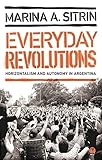Everyday revolutions horizontalism and autonomy in Argentina
Material type: TextPublication details: New York Zed Books 2012Description: xv,256 p. ill. ; 22 cmISBN:
TextPublication details: New York Zed Books 2012Description: xv,256 p. ill. ; 22 cmISBN: - 9781780320496
- 303.4840982 23 SI-E
- HN263.5 .S57 2012
 Print
Print
| Item type | Home library | Collection | Call number | Status | Date due | Barcode | |
|---|---|---|---|---|---|---|---|
 Print
Print
|
OPJGU Sonepat- Campus Main Library | General Books | 303.4840982 SI-E (Browse shelf(Opens below)) | Available | 139342 |
Browsing OPJGU Sonepat- Campus shelves, Collection: General Books Close shelf browser (Hides shelf browser)

|

|

|

|

|

|

|
||
| 303.4840956 BA-L Life as politics : how ordinary people change the Middle East / | 303.4840973 MC-C Cultures of defiance and resistance social movements in 21st-century America | 303.4840982 AU-C Contentious lives two Argentine women, two protests and the quest for recognition | 303.4840982 SI-E Everyday revolutions horizontalism and autonomy in Argentina | 303.485 ZI-P Pandemic COVID-19 shakes the world | 303.49 BR-V Vital signs 1995 | 303.49 MA-T 2030 spike countdown to global catastrophe |
Includes bibliographical references (p. [233]-249) and index.
A brief history of movements and repression in Argentina -- From rupture to creation: new movements emerge -- Horizontalidad -- New subjectivities and affective politics -- Power and autonomy: against and beyond the state -- Autogestión, territory, and alternative values -- The state rises: incorporation, cooptation, and autonomy -- Measuring success: affective or contentious politics?.
"In the wake of the global financial crisis, new forms of social organization are beginning to take shape. Disparate groups of people are coming together in order to resist corporate globalization and seek a more positive way forward. These movements are not based on hierarchy; rather than looking to those in power to solve their problems, participants are looking to one another. In certain countries in the West, this has been demonstrated by the recent and remarkable rise of the Occupy movement. But in Argentina, such radical transformations have been taking place for years. Everyday Revolutions tells the story of how regular people changed their country and inspired others across the world. Reflecting on new forms of social organization, such as horizontalism and autogestión, as well as alternative conceptions of value and power, Marina Sitrin shows how an economic crisis spurred a people's rebellion; how factory workers and medical clinic technicians are running their workplaces themselves, without bosses; how people have taken over land to build homes, raise livestock, grow crops, and build schools, creating their own art and media in the process. Daring and groundbreaking, Everyday Revolutions serves as an instructive example for activists the world over. It shows how the experiences of the autonomous movements in Argentina can help answer the question of how to turn a rupture into a revolution."--Publisher's website.
There are no comments on this title.

